Create an instant online store.
Get your 14-day free trial. Pick a professional template, start selling today, and upgrade anytime.



- Sellfy Blog
- Tips & tricks
- | by Aleksey Haritonenko , Jan 16, 2025
10 best eCommerce platforms for digital products (2026)

If you’re a digital creator, blogger, influencer, or anyone in between looking to sell digital products, you’re in luck because starting an online business has never been easier.
Here’s why:
Currently, there are at least a couple dozen eCommerce platforms to sell digital products online. And the best part is that most of them work perfectly fine and serve their intended purpose.
However, sometimes that’s not enough, as some platforms may not be suitable for selling certain types of products, like downloads, online courses, memberships, VOD, and so on. That’s why we’ve put together a list of the best eCommerce platforms for each type of digital product and business model.
Best eCommerce platforms for digital products
So, let’s take a closer look at the crème de la crème of the eCommerce platforms for selling digital products and downloads:
1. Sellfy — the best eCommerce platform to sell digital products
Sellfy isn’t just an eCommerce platform, it’s THE eCommerce platform for selling digital products.
Developed initially as a service for selling just digital products, Sellfy quickly became an absolute leader in the niche. Later on, Sellfy was transformed into a full-fledged hosted eCommerce solution for creators and artists.
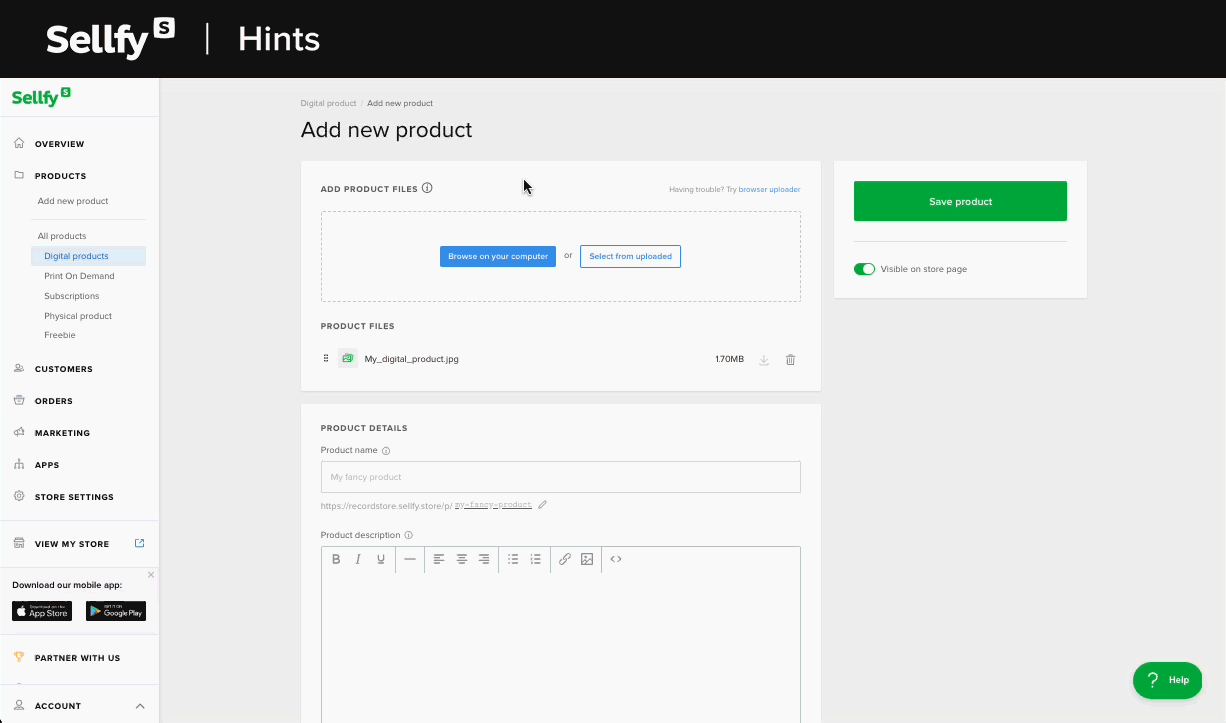
Now, you can sell just about anything from your Sellfy store including subscriptions, physical, and even print-on-demand goods — all from one place. It means that you won’t have to look for external services in case you decide to roll out your merch.
With Sellfy, you get to choose how to sell your products — you can either build a professional-looking store, embed Buy Now buttons and add a checkout page into an existing website, or simply share product links on social media platforms. As a bonus, Sellfy has an effortless setup — it won’t take you more than 10 minutes to start selling.
In addition to that, Sellfy provides all the necessary tools to launch and grow your online business — hosting, an online store, customization possibilities, beautiful pre-made store themes, a set of powerful marketing tools, built-in store analytics, and a host of useful app integrations like Google Analytics and others.
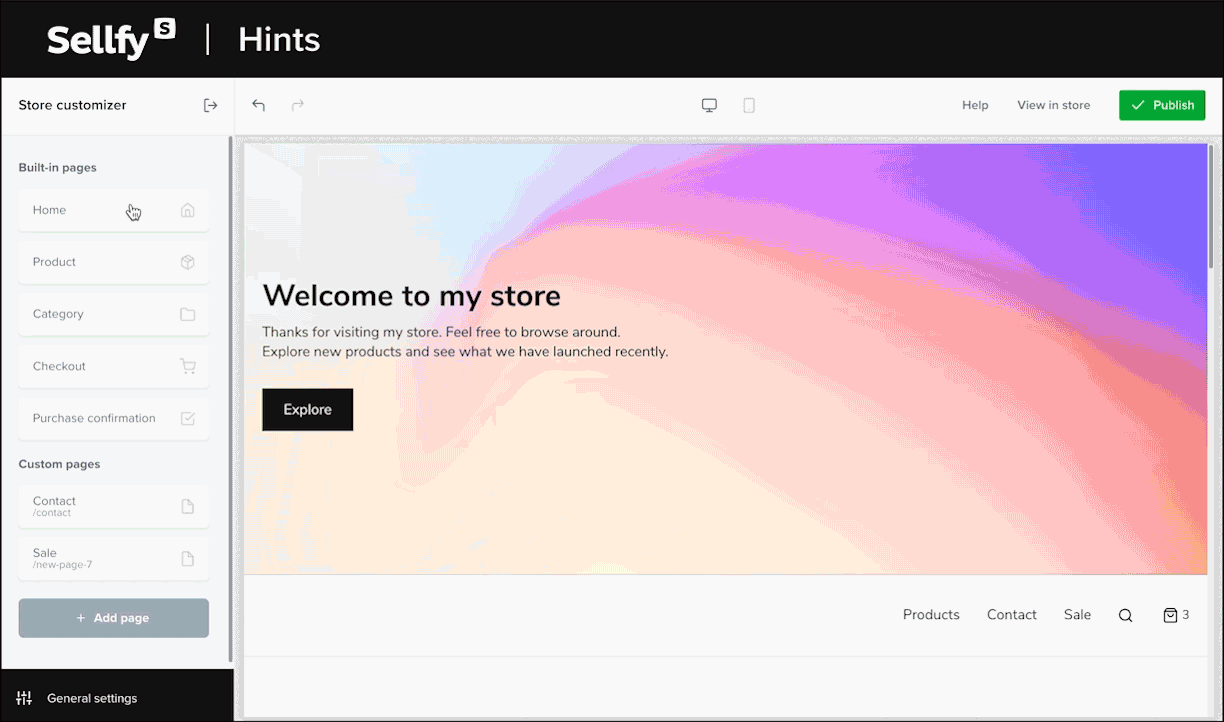
Core features:
- Unlimited products, storage, and bandwidth
- Optimized digital product delivery
- Email marketing
- Upselling
- Cart abandonment
- Discounts and coupon codes
- Store embed options with on-site checkout
- Sharable product links
- Multiple payment gateways
- Anti-piracy features
- Third-party apps and services
- 24/7 customer support

Create an online store for your digital products
See howBest for:
Sellfy is a perfect solution for all types of creators and aspiring digital entrepreneurs. Everyone looking for an affordable eCommerce platform with an effortless setup and tons of useful features will find Sellfy an excellent fit.
Pricing (Billed Bi-annually):
Considering how much Sellfy has to offer, its pricing structure is super affordable and all plans are reasonably priced:
- Starter plan ($22/month)
- Business plan ($59/month)
- Premium plan ($119/month)
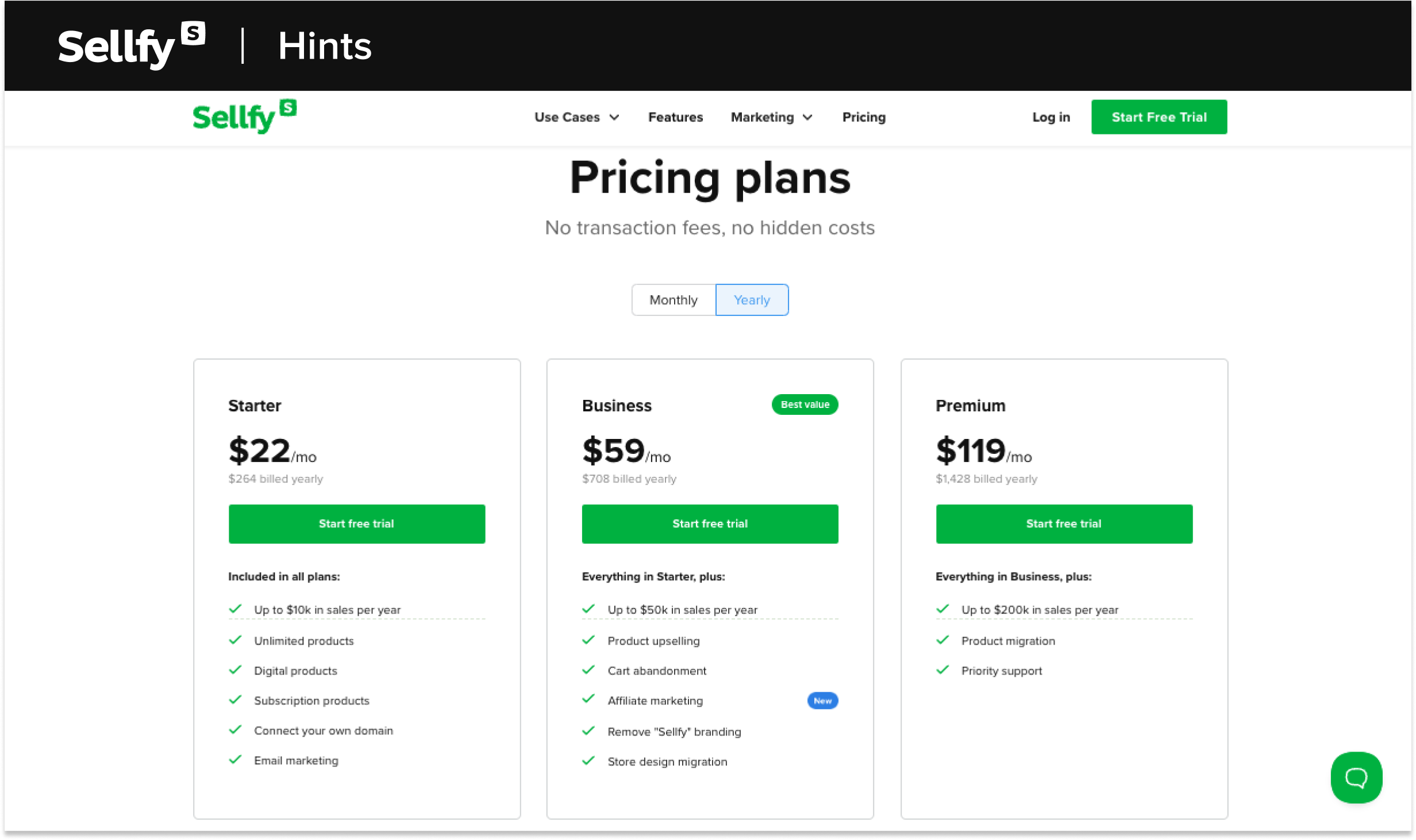
2. Teachable — great for selling online courses and educational content
As you might have understood from the name, Teachable is a platform that is centered around selling educational products.
But wait, there’s more:
While Teachable is primarily focused on selling online courses, it can also be used for selling all sorts of digital products including downloads and even memberships. Plus, it’s very beginner-friendly — you can use its comprehensive course builder to easily create as many courses as you need as well as build a basic landing page from scratch. There’s also an option to embed your educational content and products into an existing website or blog.
When it comes to customization, the platform offers a simple drag-and-drop page builder and a host of customizable templates to choose from. Apart from that, Teachable offers a variety of sales and marketing tools, including coupons, promotions, and email marketing, to help users promote and sell their courses. Even though it lacks services like email marketing, there’s a possibility to integrate as many external services as you need. But, you have to keep in mind that most external services will cost you extra.

Best for:
Best suited for creators looking for a simple but effective enough way to make money with educational content. Even though you can sell digital products alongside online courses and learning subscriptions, you must understand that the platform is geared toward courses.
Pricing (billed annually):
While Teachable does offer a limited free plan, users must pay $1 plus 10% for each transaction. Aside from that, there are also two paid plans:
- Basic plan ($39/month + 5% transaction fee)
- Pro plan ($119/month)
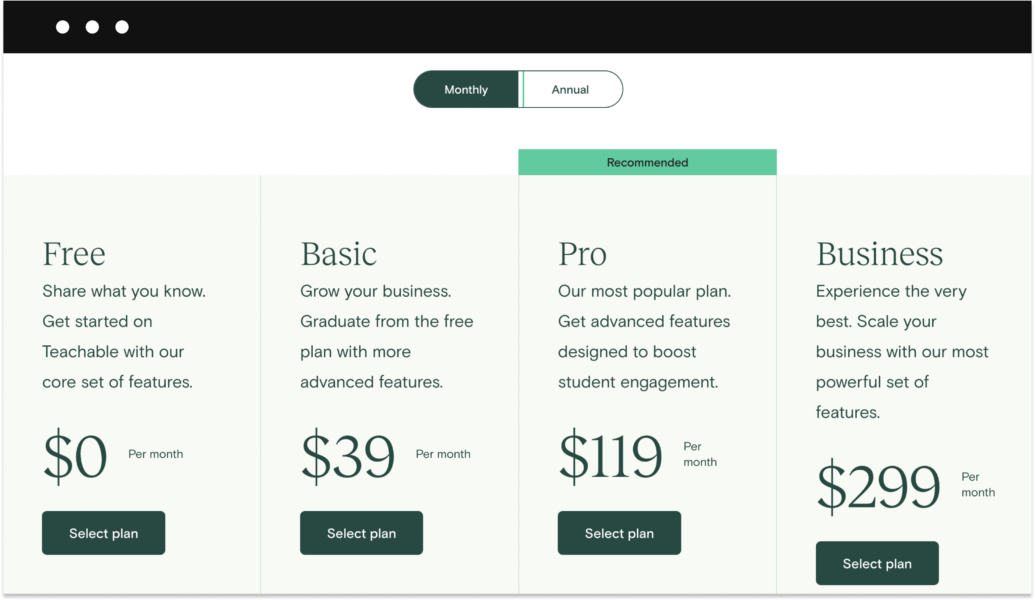
3. Podia — an eCommerce platform with a built-in course builder
Podia is an eCommerce platform that helps creators start selling anything digital including memberships, online courses, or digital downloads.
The platform offers a simple interface which makes the setup process very beginner-friendly. The greatest thing about Podia is that although the platform wasn’t created exclusively to sell online courses, it offers a built-in course builder.
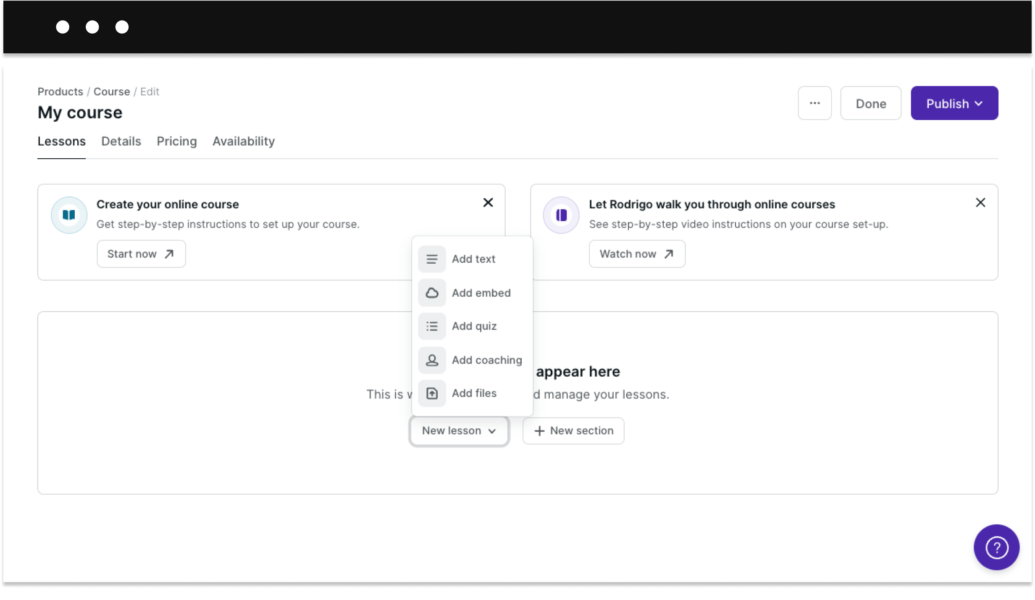
With its drag-and-drop feature, you can create a basic online course by adding different sections and lessons and rearranging them however you like. You can also add multimedia content, such as videos, audio files, and PDFs.
Overall, there are five types of products that you can sell on Podia:
- Online course
- Digital download
- Webinar
- Bundle
- Coaching session
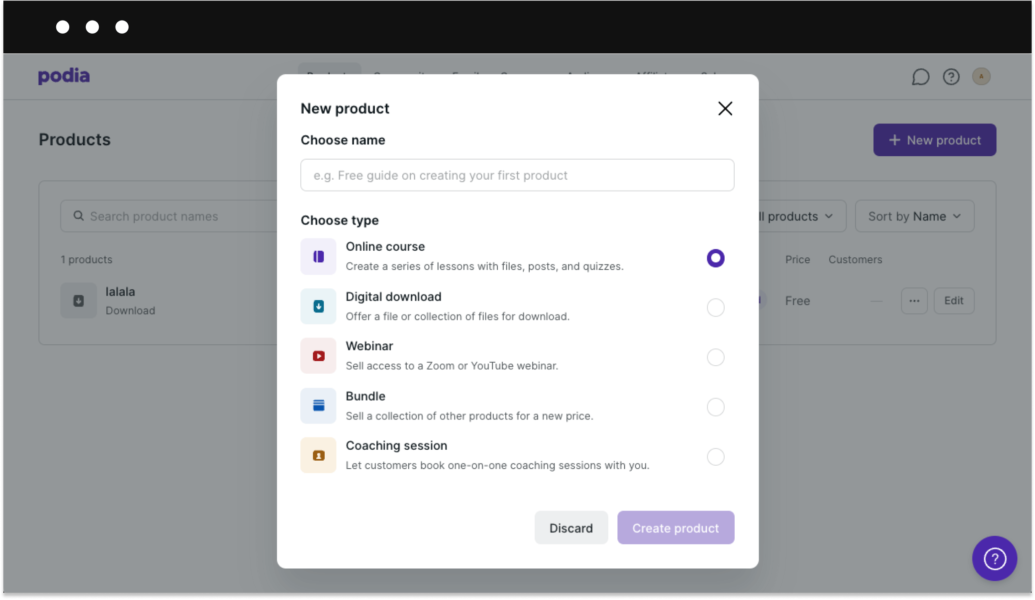
Built with beginners in mind, Podia offers you a quick way to build a product page with its comprehensive store editor. Though, it’s worth mentioning that Podia still lacks some basic customization features like store themes.
Best for:
With its relatively user-friendly interface, Podia is the perfect choice for digital entrepreneurs looking to list a couple of products for sale. But when compared to platforms like Teachable, its course-building functionality is not that advanced.
Pricing (billed annually):
Podis has four pricing options. Each plan gives access to a different set of features and transaction fee percentages:
- Free plan with an 8% transaction fee.
- The Mover plan costs $33 and allows you to sell unlimited products.
- The Shaker plan costs $75 and offers all the same features + unlimited webinars and affiliate programs.
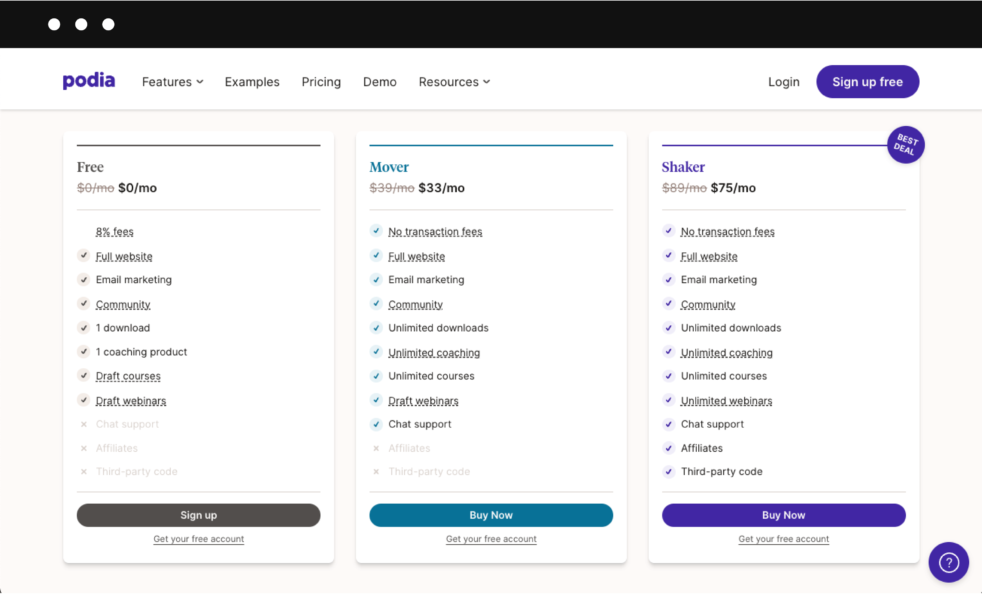
4. Shopify — one of the most popular eCommerce platforms
Without a doubt, as one of the most popular eCommerce platforms, Shopify definitely deserves a spot on this list.
Shopify is an all-in-one eCommerce platform that allows you to create a complete online store and sell (almost) any product you like. Shopify’s main advantage is that it’s fully customizable and with the right set of app integrations (there are 3000+ apps available in Shopify’s marketplace), you can transform your eCommerce store into anything you want.
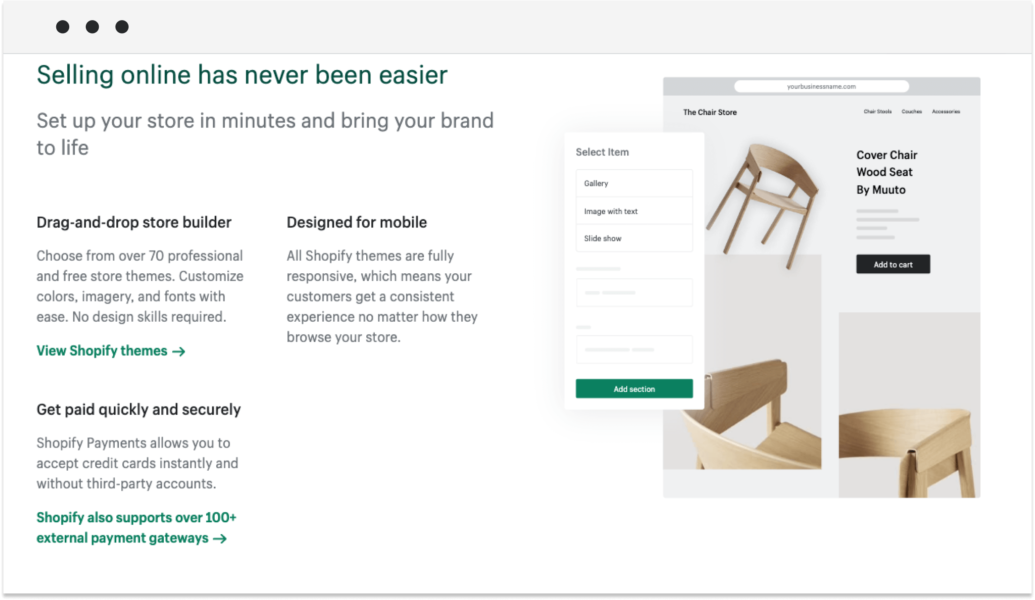
However, if you’re planning to center your business around digital downloads, Shopify is hardly the top choice.
Why is that?
Well, for one you can’t even sell digital products from your Shopify store without installing an app first. Sure, there’s a huge choice of services in Shopify’s marketplace, but it’s still a hassle.
Plus, even though Shopify gives you access to advanced marketing integrations, solutions like Sellfy offer much more advanced in-built marketing functionality.
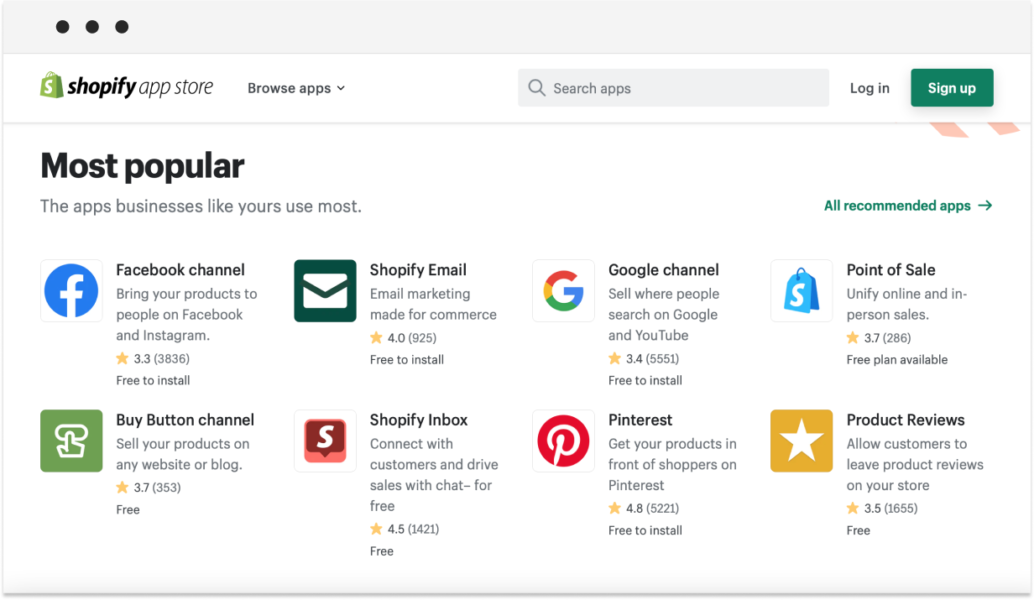
Shopify boasts simplicity when it comes to setting up a store. However, don’t be fooled because while web development skills are not necessary, it still comes with a substantial learning curve. And the fact that tons of “how-to” guides have cropped up to help navigate this platform only proves this fact.
Best for:
Thanks to its flexibility Shopify can fit almost anyone looking for a complete eCommerce solution. If you are ready to invest time and money (mainly in third-party apps), you can build a great eCommerce store with Shopify.
Pricing (billed annually):
- Basic plan ($29/month and 2.9% + 30¢ transaction fee)
- Shopify plan ($79/month and 2.6% + 30¢ transaction fee)
- Advanced plan ($299/month and 2.4% + 30¢ transaction fee)
But you must keep in mind that Shopify charges extra for third-party app integrations. For example, paid store themes cost $140-$180, and monthly app fees can range from a few dollars to $100.
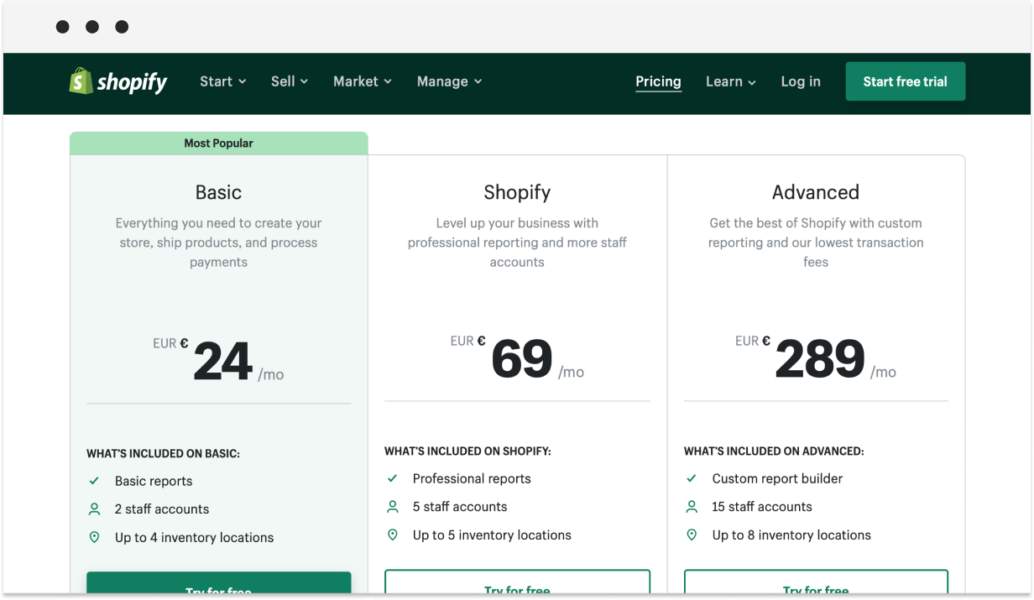
5. SamCart — a feature-rich shopping cart solution
SamCart is mainly a web-based checkout solution. In other words, it’s an online sales tool that allows you to sell digital downloads and online courses by integrating a shopping cart into your website or creating a dedicated product page.
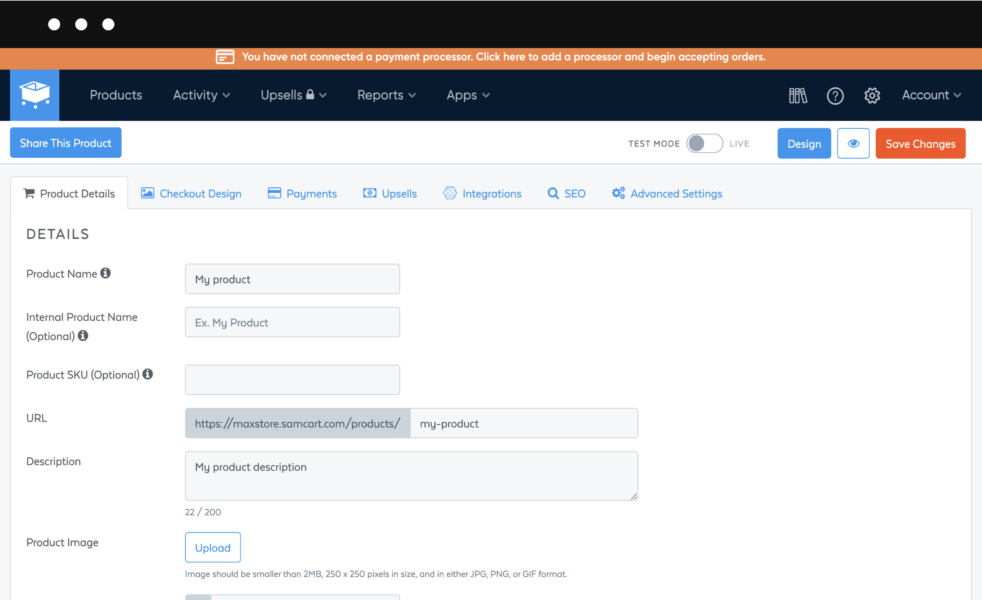
Even though SamCart doesn’t really let you build an eCommerce store for your digital products, as a checkout solution it is packed with great eCommerce tools. For example:
- Сheckout optimization features such as checkout page A/B testing, one-click upsells, pre-purchase order bumps, pay-what-you-want pricing, sales analytics, and more.
- eCommerce features like third-party app integration, all major payment gateways, calculating digital sales tax, refund management, etc.
- Additional features like cart abandonment, subscription saver, and affiliate program.
When it comes to checkout page customization, you get access to 18 customizable template that allows you to create a unique and personalized checkout experience for your customers. Plus, the drag-and-drop editor makes it easy to customize each template to your liking.
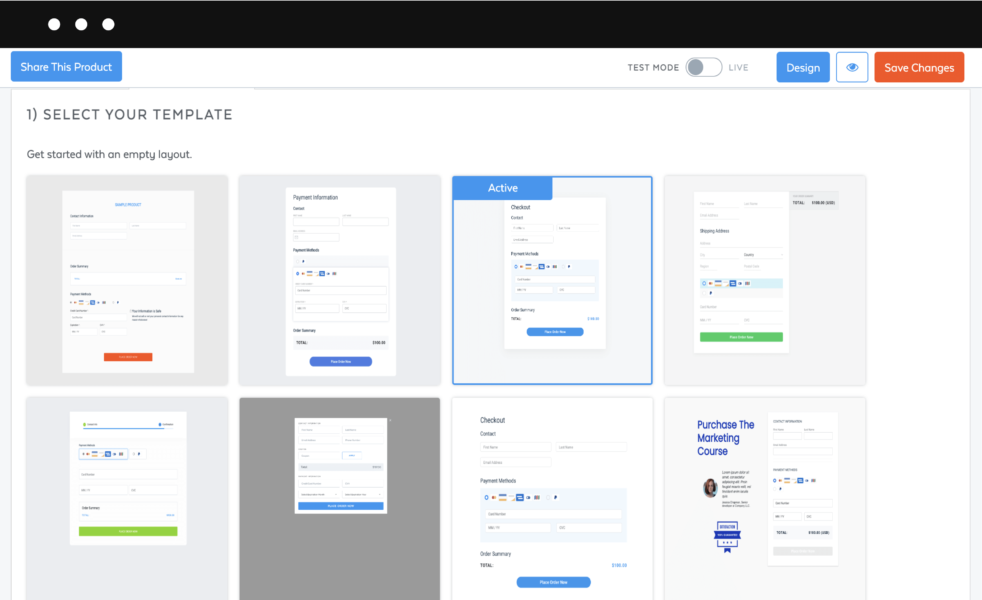
SamCart also offers an opportunity to create a single-product landing page option by choosing one of the pre-designed page templates. You can then customize it to fit your needs. Just keep in mind that at its core, SamCart is a checkout page, so while customization is possible, it’s important to have realistic expectations.
Best for:
Thanks to the advanced eCommerce toolkit and quite expensive plans, SamCart won’t be a great fit for beginners. However, existing businesses might find it helpful to fight cart abandonment and growing sales.
Pricing (billed annually):
Currently, there are three subscription plans:
- The Launch is $39/month.
- The Grow is $79/month.
- The Scale plan for $199/month has all of the coolest features like A/B testing, cart abandonment, etc.
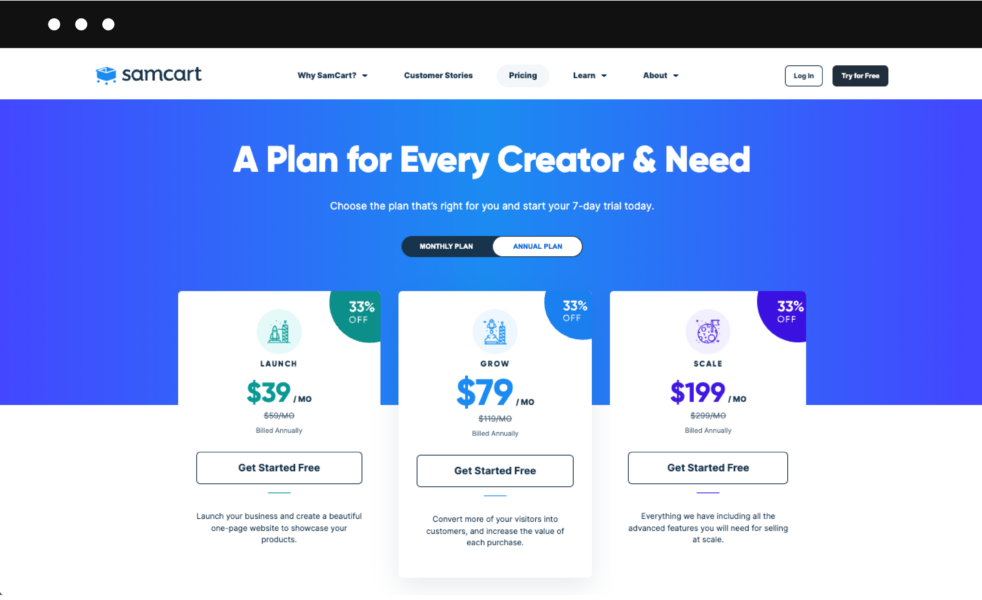
6. SendOwl — an affordable but solid shopping cart solution
SendOwl is another platform that can help you sell digital products from your own website. In essence, it’s more affordable (also less advanced) version of SamCart.
Similar to SamCart, Sendowl is a checkout solution that allows you to sell digital downloads by integrating a shopping cart into an existing website or sharing product links.

Create an online store for your digital products
See howSendOwl is really easy to use thanks to the simple interface and lack of complicated functionality. Uploading your products and configuring a conversion-optimized checkout module will take no more than a few minutes.
But don’t be fooled by its simplicity, because SendOwl offers a decent set of conversion optimization tools. For example:
- Upselling
- Cart abandonment
- Discounts, coupon codes, and vouchers
- Freebies
- Pay what you want pricing
- Affiliate center
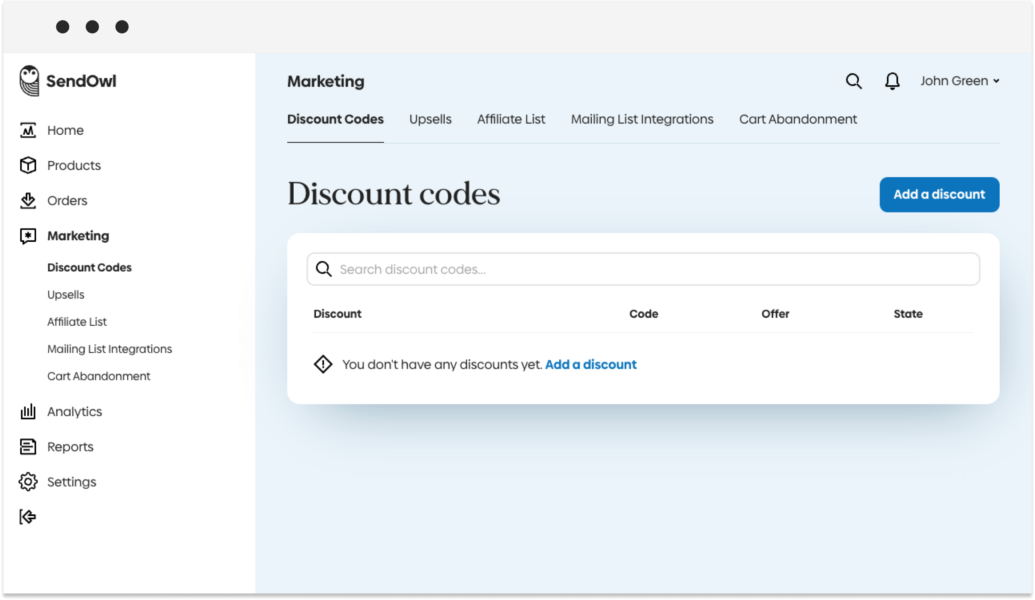
The main disadvantage of SendOwl is that it’s not an all-in-one eCommerce platform, meaning that can’t use it to build a store for your products.
Make sure to check out our detailed comparison of SamCart and SendOwl.
Best for:
Perfect for an established online creator, preferably with a large social media following, or a successful blog looking to sell digital products from an existing website.
Pricing (billed annually):
SendOwl used to have a free plan. They don’t anymore. Instead, they offer three paid plans, that are not really that different from one another as all of them come with the same set of features.
- The Starter has a three-month free trial period. After three months are over you’ll have to pay 9 dollars a month plus a 5% transaction fee.
- The Growth plan is $15/month plus a 0.33 cent per order management fee.
- The Pro plan is $39/month plus a 0.17 cent per order management fee.
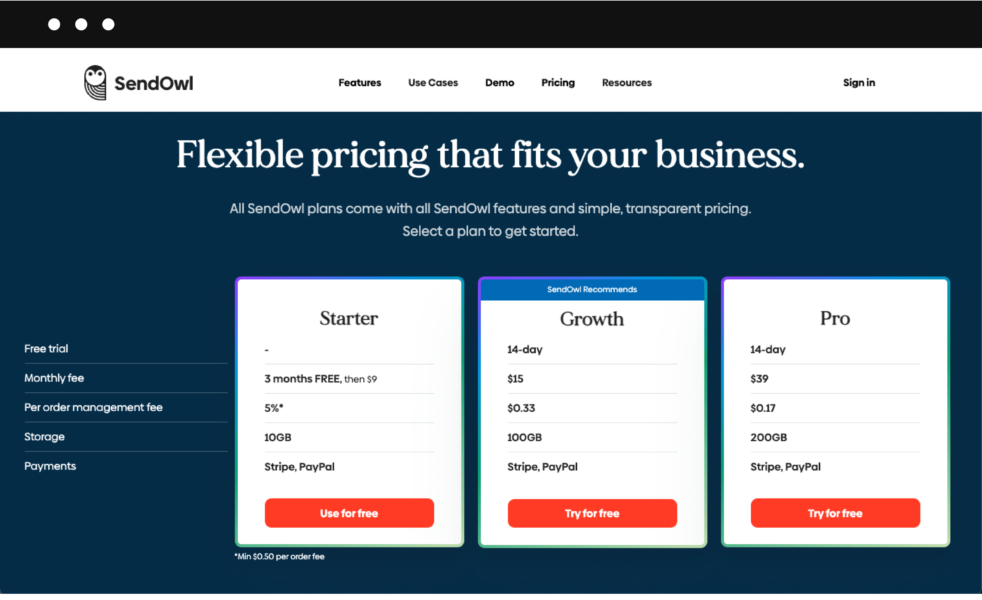
7. Gumroad — simple eCommerce platform without a subscription fee
Gumroad is a basic eCommerce platform that helps artists and creators start selling downloads and other products from a simple landing page. Somewhat similar to Sellfy, Gumroad is an all-in-one platform. Meaning that you don’t need to have an existing website as Gumroad allows you to create a page for your products.
While it gets the job done, there’s nothing unique or exciting about the platform aside from the fact that it doesn’t charge a subscription fee. However, it’s worth mentioning that Gumroad takes a 10% cut of your sales. So, it all boils down to choosing whether you’re willing to pay a set monthly fee or a percentage of whatever income you earn.
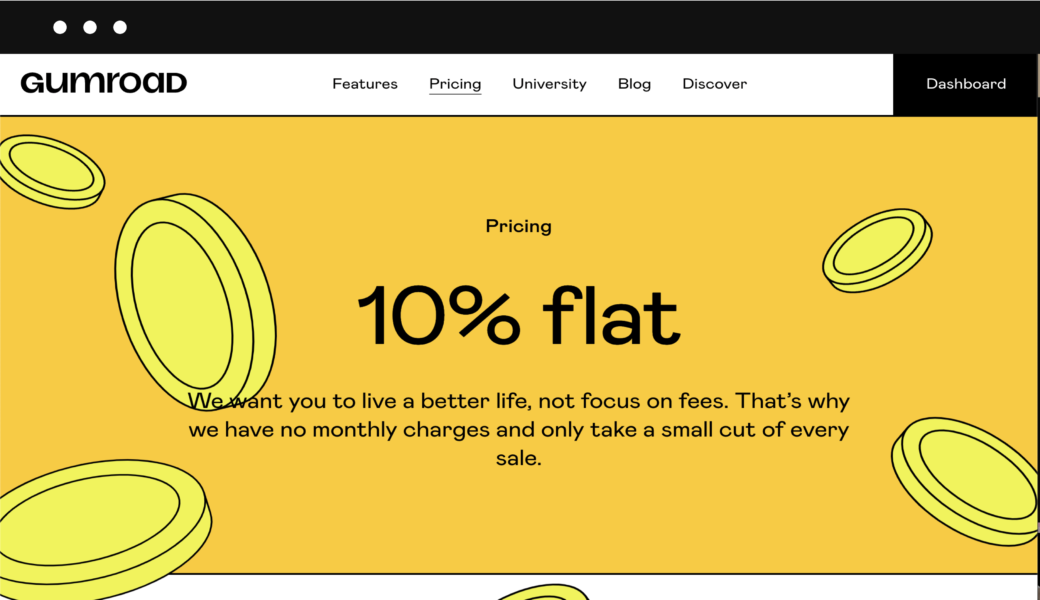
Additionally, Gumroad no longer supports PayPal payments, limiting users to accepting payments via bank transfers. This can be inconvenient, particularly for creators in regions where bank transfers aren’t widely supported.
But that’s pretty much where the resemblance ends as when it comes to built-in tools and services, Gumorad doesn’t stand against the competition. When it comes to built-in marketing tools, Gumroad doesn’t offer anything apart from coupon codes.
However, Gumroad does have one big advantage over some other platforms — a built-in email marketing tool called Workflows. Another advantage of Gumroad is that it’s an incredibly straightforward tool that literally allows you to start selling in minutes.
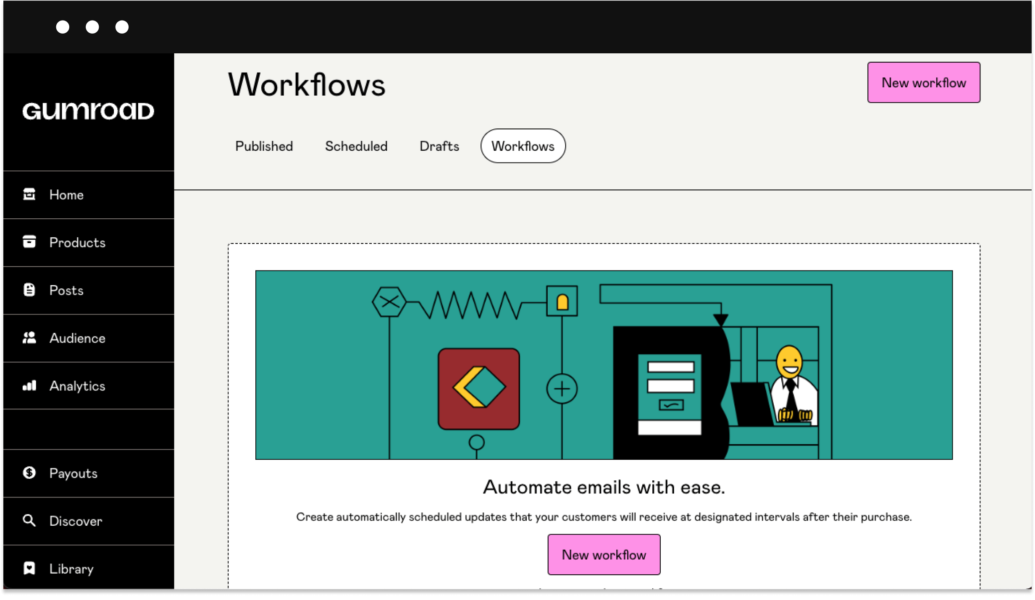
Make sure to check out our detailed comparison of Gumroad and SendOwl.
Best for:
A simple tool for creators and artists to start selling downloads and other products online almost instantly in exchange for a chunk of your income.
Pricing:
10% thansaction fee + processing fees.
8. Etsy — a creative marketplace
Even though Etsy isn’t the first option that pops into your mind when you think about selling digital products, it’s still an option worth considering.
Just so we’re clear, Etsy is neither an all-in-one eCommerce platform nor a shopping cart solution — it’s a creative marketplace. In other words, comparing Etsy to other platforms in the list is like trying to compare an art fair to standalone art stores. Plus, it seems that Etsy won’t be useful to sell services. It’s more geared towards handmade items, so you might not find much success promoting your talents and knowledge in this particular marketplace.
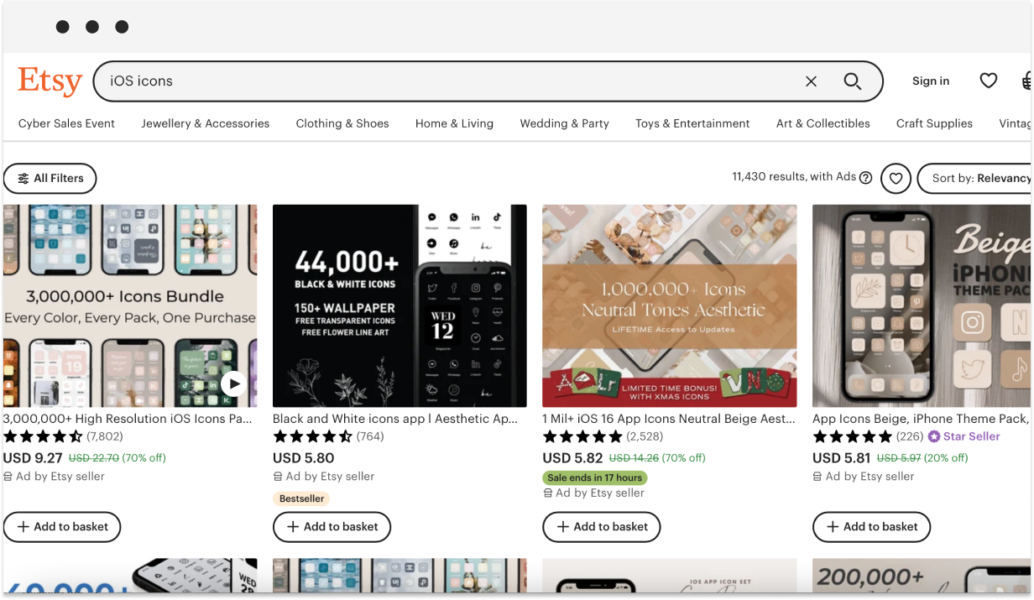
The best thing about Etsy is that it gives you easy access to the creative market. Essentially, Etsy is a gigantic community of art and craft enthusiasts who are eager to discover your unique offerings. You’ll have direct access to 30+ million potential customers who are actively searching for new and interesting products.
However, with so many products competing for attention, it’s important to make sure yours stand out from the rest.
Luckily, Etsy offers a bit more than just a marketplace — it also allows you to create create a personal storefront for your products with a service called Pattern by Etsy. The service slightly resembles an eCommerce platform but is not as advanced or customizable.
Make sure to check out our detailed comparison of Gumroad and Etsy.
Best for:
Etsy can be a great place for a beginner looking for a no-fuss way to sell a couple of products. So, if you’re not looking for any complicated setups and customization (the only thing you can customize on Etsy is your logo), you could give it a try.
Pricing (billed monthly):
It’ll cost you a monthly fee of $15, but it’s nothing more than an add-on for someone already selling their products on Etsy.
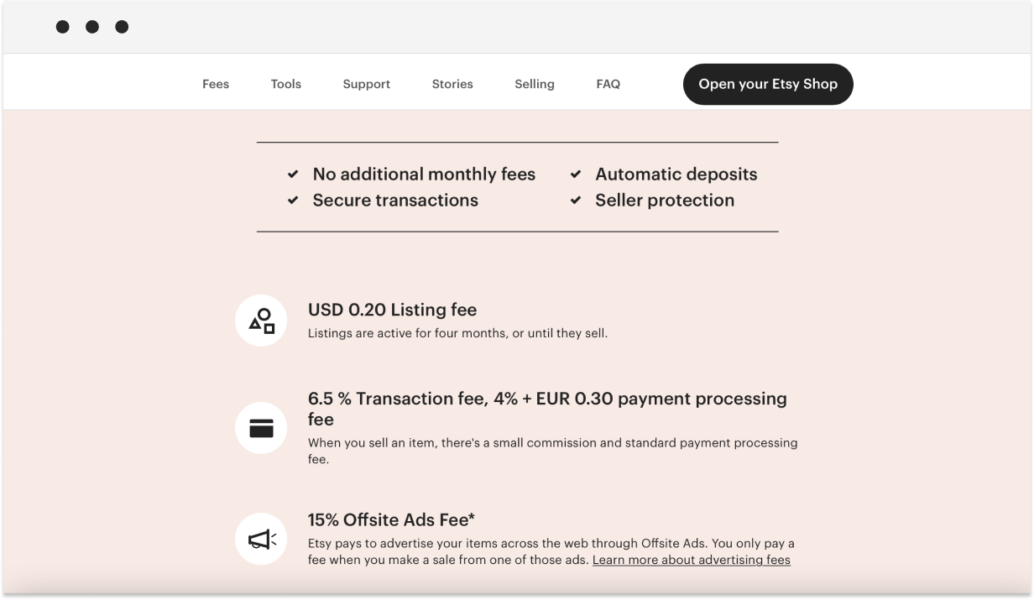
9. Member-press — best WordPress plugin for monetizing digital content
MemberPress is a WordPress plugin that helps you to start selling all sorts of digital products from online courses to memberships.
One of its coolest features is that it allows you to control user’s access to certain digital products with subscriptions and VIP accounts. This means that you can offer your digital products as part of a membership plan, giving followers access to exclusive content and downloads.
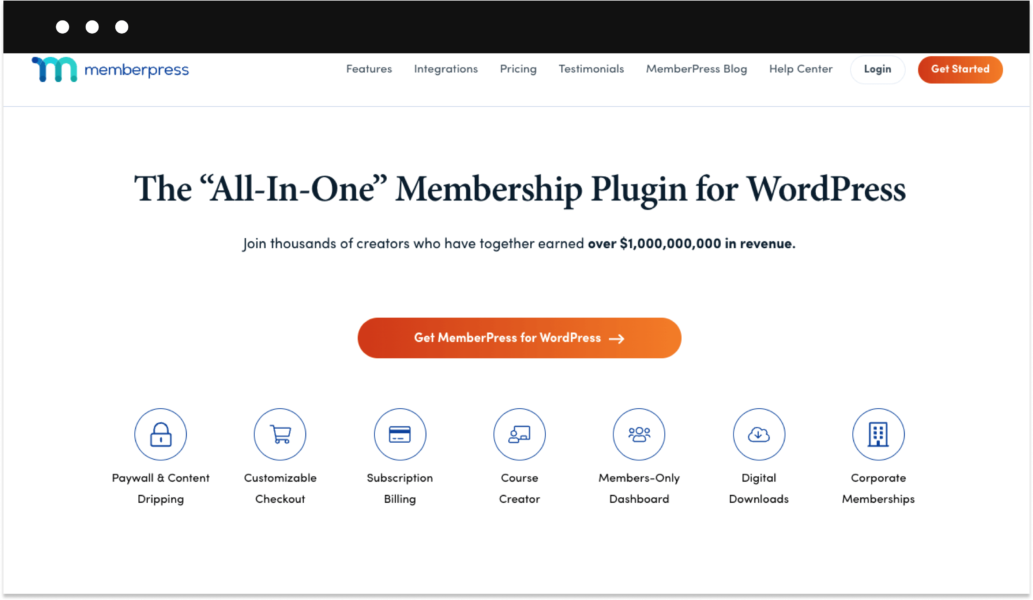
The plugins offer a range of powerful eCommerce features like membership subscription tracking, in-depth integration options, access to PayPal and other payment methods, seamless integration with WordPress and WooCommerce, affiliate support, etc.
MemberPress also gives you a lot of freedom when it comes to customization. With the ability to modify the plugin’s appearance and functionality, you can create a unique and professional-looking storefront that showcases your digital products in the best way possible. It’s worth mentioning, however, that this will ask for in-depth experience in operating a WordPress website.
Best for:
MemberPress is best suited for WordPress website owners who are looking want to monetize their content or sell digital products. It’s also great for businesses or organizations that want to offer exclusive content or services to their members.
Pricing (billed annually):
MemberPress doesn’t have a free plan. Instead, they offer three pricing options:
- The Basic Plan is $179 per year.
- The Plus Plan is $299 per year.
- The Pro plan is $399 per year.
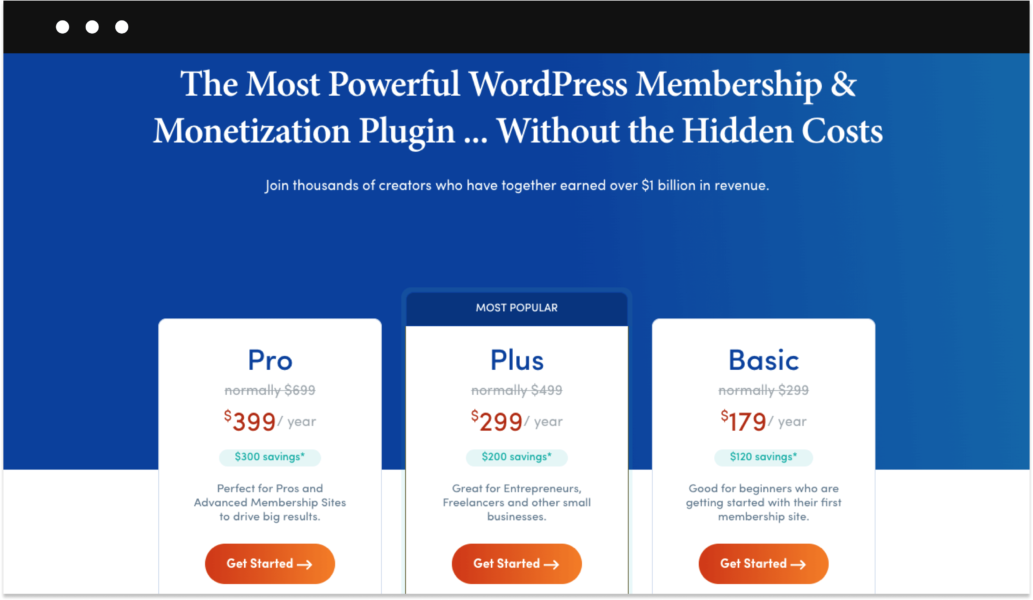
10. Ko-fi — a virtual tip jar
Ko-fi is a slightly different alternative to the platforms already mentioned in the list. In essence, Ko-fi is a virtual tip jar that allows your followers to support you by donating money.
There are several ways to earn money on Ko-fi. For example, by setting up a fan page you can offer exclusive content to your audience in exchange for their support – they can easily donate the cost of a virtual cup of coffee to show their appreciation for your hard work.

Apart from that, you can also set up your own Ko-fi Shop to sell physical and digital products. Sure, the list of available eCommerce features is quite poor, and storefront customization is also super basic. But at the end of the day, it helps you get the job done.
Plus, Ko-fi is super easy to set up. You just need to pick a username, add a photo and bio, and connect a payment source like PayPal or Stripe. The whole process will literally take just a minute or two and you’ll have your page up and running.
Pricing:
Ko-fi has a free plan and doesn’t take a percentage from your donations. But you’ll have to share 5% of everything you earn in your Ko-fi Shop.
Best for:
Ko-fi simplifies the idea of crowdfunding for creative businesses. It’s perfect for established bloggers and content creators that are looking for a way to close part of their exclusive content behind a paywall.
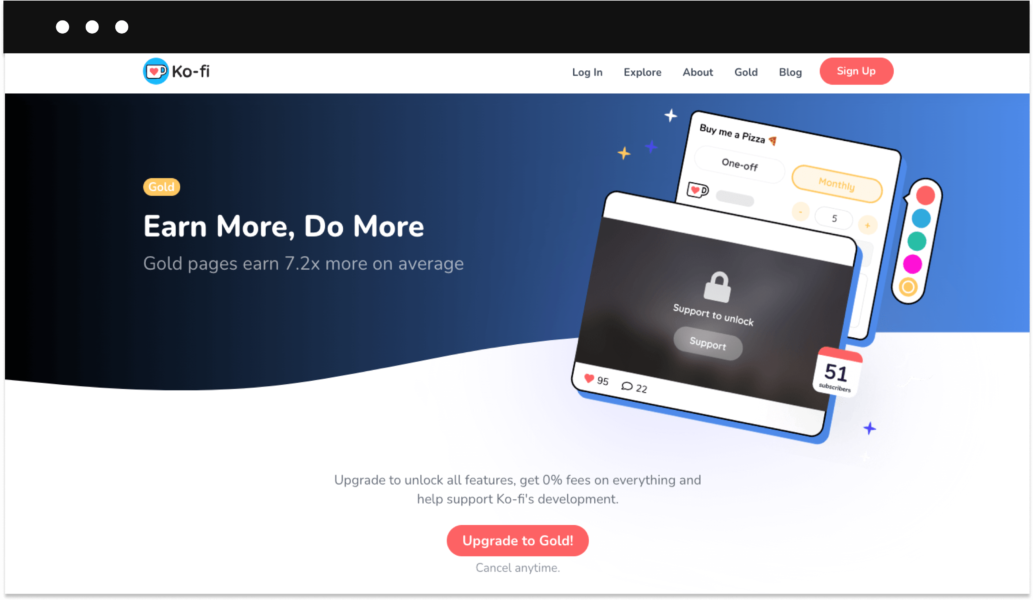
How to choose the best eCommerce platform for digital products
When choosing an eCommerce platform for selling digital products, there are several characteristics that you need to be on the lookout for:
1. Ease of use
Even if you have experience in eCommerce, you still don’t want to waste time figuring out how the platform works. Ideally, you need to look for an all-in-one solution that lets you create a store for your digital products in minutes. And trust me—it’s possible.
2. Pricing and additional costs
Expensive doesn’t always mean better. Try to minimize additional expenses by selecting a platform with many built-in features to avoid paying for app integrations, store themes, or services. You should also opt for platforms that don’t charge transaction fees. Otherwise, you’ll simply lose your hard-earned money.
3. Digital downloads and video streaming
From a business standpoint, it would be more advantageous to opt for a platform that supports both video streaming and digital downloads. This way you won’t have to choose just one business strategy, thus you’ll be able to make more money with various types of content.
4. Customization
You have to be able to make your online store look professional and visually appealing. It’s better to use an eCommerce platform that not only offers an easy-to-navigate store customizer tool but also offers some pre-designed themes.
5. Built-in marketing features
Coming up with an astute marketing strategy is crucial when it comes to promoting your products and growing your business. That’s why it’s important to choose an eCommerce platform with the most built-in marketing tools.
FAQ: Best eCommerce platforms for selling digital products
Can you use an eCommerce platform to sell digital downloads?
Absolutely! Many eCommerce platforms, including Sellfy, are designed specifically for selling digital products. Such services, usually, offer features like secure payment processing, automatic file delivery, and customizable storefronts to help you effectively sell and distribute your digital downloads to customers worldwide.
What is the best eCommerce platform for selling digital products?
When it comes to selling digital products, Sellfy is one of the best options. It offers a user-friendly interface, customizable storefronts, secure file delivery, unlimited storage, and zero transaction fees. Sellfy caters to a wide range of digital products, from ebooks to music, courses, and more. With its built-in marketing features and global reach, it empowers creators to maximize their sales potential.
How to choose the best eCommerce platform for digital products?
Consider factors like ease of use, customization options, pricing structure, and the availability of built-in marketing features. Look for platforms that specialize in digital products and offer secure file delivery. Take advantage of free trials to test different platforms and find the one that aligns with your specific needs. Ultimately, choose a platform like Sellfy that supports your product range and helps you grow your digital product business.
English
Related topics
Tips for creators
Join thousands of creators receiving sales tips, marketing resources, and inspiring stories. No spam, pure value.



